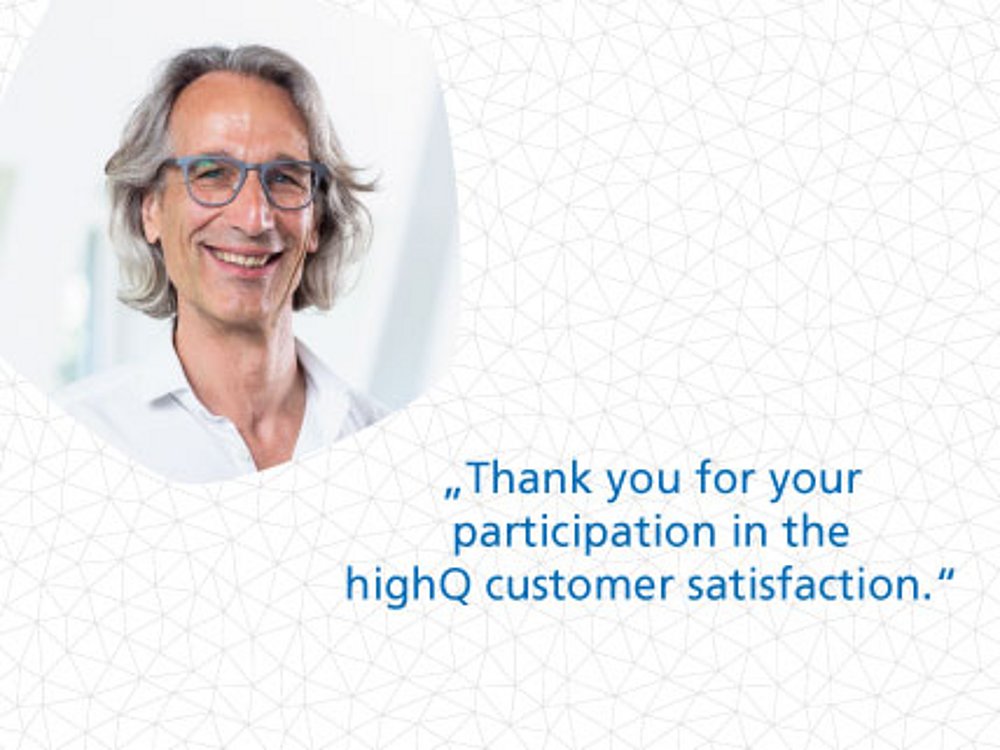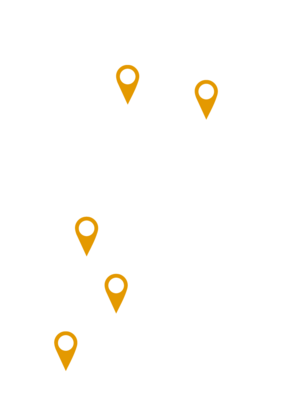![[Translate to English:] [Translate to English:]](/fileadmin/_processed_/0/c/csm_ISO-27001-Zertifikat_93a7040c92.jpg)

highQ News
Here you will find the latest media reports, inspiring stories and in-depth insights
![[Translate to English:] [Translate to English:]](/fileadmin/_processed_/0/c/csm_ISO-27001-Zertifikat_93a7040c92.jpg)
![[Translate to English:] [Translate to English:]](/fileadmin/_processed_/e/9/csm_Muenster_Bus-Hbf_77111a73e1.jpg)
New driving feeling in Münster thanks to networked mobility offers
![[Translate to English:] [Translate to English:]](/fileadmin/_processed_/d/1/csm_Collage_InnoTrans_2022_baaea81ec5.jpg)
The mobility of the future was experienced live at highQ
![[Translate to English:] [Translate to English:]](/fileadmin/_processed_/e/4/csm_ZML_Leitgrafik-Ruhrbahn_220805_87f0c2e26f.jpg)
bonus mobil - The bonus programme of the Ruhrbahn
![[Translate to English:] [Translate to English:]](/fileadmin/_processed_/1/f/csm_Collage_Kongress_Vortraege-1_08fa1495d9.jpg)
The future of mobility starts now
![[Translate to English:] [Translate to English:]](/fileadmin/_processed_/5/f/csm_AzweiO_Fahrraeder_63960facfe.jpg)
highQ implements an operational mobility solution for AzweiO

Mobility Platform 2.0 at Stadtwerke Osnabrück
![[Translate to English:] [Translate to English:]](/fileadmin/Bilder/News/2118_Ladesaeule_2021-06-09.jpg)
highQ invests in environmentally friendly mobility
![[Translate to English:] [Translate to English:]](/fileadmin/_processed_/f/d/csm_2009_VBB-pruefApp_cc3758ae88.jpg)
Double surcharge for the bOOD project
![[Translate to English:] [Translate to English:]](/fileadmin/_processed_/b/b/csm_2114_GAIA-X_2021-04-26_a14c46cac7.jpg)
"We've been at it from day one"
![[Translate to English:] [Translate to English:]](/fileadmin/_processed_/6/1/csm_2111_NAHBUS_09de9f9400.jpg)
NAHBUS gets mobility app for public transport
![[Translate to English:] [Translate to English:]](/fileadmin/_processed_/b/b/csm_2114_Sylt_230b7be683.jpg)
Vacation island offers electric buses On Demand

Valuable feedback from users
![[Translate to English:] [Translate to English:]](/fileadmin/_processed_/1/b/csm_2109_BusterS_aa4f2a31ec.jpg)
BusterS: Safe paths for cyclists
![[Translate to English:] [Translate to English:]](/fileadmin/_processed_/8/7/csm_2021_Spenden_2020_43ab1ef65f.jpg)
"Social commitment is important to us at highQ"
![[Translate to English:] [Translate to English:]](/fileadmin/Bilder/News/2018_Start-YANiQ_2020-10-26.jpg)
highQ revolutionizes the bus service of the Osnabrück public utility
![[Translate to English:] [Translate to English:]](/fileadmin/Bilder/News/2016_Auszeichnung-Stadtwerke-Award-CiBo.jpg)
Distinguished with the Stadtwerke Award
![[Translate to English:] [Translate to English:]](/fileadmin/_processed_/5/b/csm_2015_Kick-off-MobilitySuite_2020-08-11_7ff438c221.jpg)
Kick-off of the highQ MobilitySuite
![[Translate to English:] [Translate to English:]](/fileadmin/_processed_/3/e/csm_2014_Nominierung_Deutscher_Nachhaltigkeitspreis_2020-07-02_a682a8df22.png)
highQ is nominated for the German Sustainability Award 2021
![[Translate to English:] [Translate to English:]](/fileadmin/_processed_/7/8/csm_2010_bOOD_5b3c698f03.jpg)
highQ wins the tender of the VHH
![[Translate to English:] [Translate to English:]](/fileadmin/_processed_/c/4/csm_2013_NL-Frankfurt-HOLM_70559044d3.jpg)
New branch office in Frankfurt am Main
![[Translate to English:] [Translate to English:]](/fileadmin/Bilder/News/2011_Schwabenbund.png)
Schwabenbund: Uniform ticketing sales platform
![[Translate to English:] [Translate to English:]](/fileadmin/_processed_/f/d/csm_2009_VBB-pruefApp_cc3758ae88.jpg)
Successful project start mytraQ VBB-prüfApp
![[Translate to English:] [Translate to English:]](/fileadmin/_processed_/b/a/csm_2004_Prototyp-Web-Anwendung_b5d40cf842.jpg)
Prototype Web application programmed in just one day
![[Translate to English:] [Translate to English:]](/fileadmin/Bilder/News/2005_highQ_Kundenzufriedenheitsanalyse.jpg)
highQ again receives extensive customer feedback
![[Translate to English:] [Translate to English:]](/fileadmin/_processed_/f/e/csm_2001_TO_Zertifizierung_8024459766.jpg)
TicketOffice certified according to GoBD
![[Translate to English:] [Translate to English:]](/fileadmin/_processed_/9/b/csm_Stadt_der_Zukunft_FAZ_2022_16cf0d466f.jpg)
Online mobility marketplace
![[Translate to English:] [Translate to English:]](/fileadmin/_processed_/6/5/csm_20230626-3L6A1645-Bearbeitet_farb_komprimiert_da89adc42a.jpg)
Barrier open for the modernised DB Sylt Shuttle
![[Translate to English:] [Translate to English:]](/fileadmin/_processed_/8/2/csm_1911_Zeitmeilen_5697370f62.jpg)
Travel smart, save time
![[Translate to English:] [Translate to English:]](/fileadmin/_processed_/0/0/csm_1910_PlanB_b30cd0f44a.jpg)
Intermodal and demand-driven: planning for transportation transformation
![[Translate to English:] [Translate to English:]](/fileadmin/_processed_/b/9/csm_1909_NeueMitarbeiter_Homepage_2560e00697.jpg)
New talent in five areas
![[Translate to English:] [Translate to English:]](/fileadmin/_processed_/5/0/csm_Abakus_und_Zirkel_News_bb992fff95.jpg)
Optimisation of property developer financing - a progress report
![[Translate to English:] [Translate to English:]](/fileadmin/_processed_/7/d/csm_Fotolia_201330167_News_2_48a2df644a.jpg)
Germany’s first ever CiBo ticketing service launches in Osnabrück
![[Translate to English:] [Translate to English:]](/fileadmin/_processed_/7/a/csm_20190604_103204_News_f3aeefc96a.jpg)
Eighty mobility experts at the highQ user forum in Frankfurt
![[Translate to English:] [Translate to English:]](/fileadmin/_processed_/a/4/csm_MaaSLABS_logo_MAIN_633bc2ecce.jpg)
MaaS L.A.B.S. research project
![[Translate to English:] [Translate to English:]](/fileadmin/_processed_/8/9/csm_highQ-transforming-mobility_428p_breit_5668d50eea.jpg)
Revenue management for every size of business
![[Translate to English:] [Translate to English:]](/fileadmin/_processed_/8/9/csm_highQ-transforming-mobility_428p_breit_5668d50eea.jpg)
Osnabrück makes multimodal mobile
![[Translate to English:] [Translate to English:]](/fileadmin/Bilder/Landingpages/mytraQ/mytraQ_Screenshot.jpg)
Equalising commuter traffic
![[Translate to English:] [Translate to English:]](/fileadmin/_processed_/8/9/csm_highQ-transforming-mobility_428p_breit_5668d50eea.jpg)
The new bwtariff
For press & marketing questions
We are at your disposal for everything to do with media releases, press & marketing.
X






